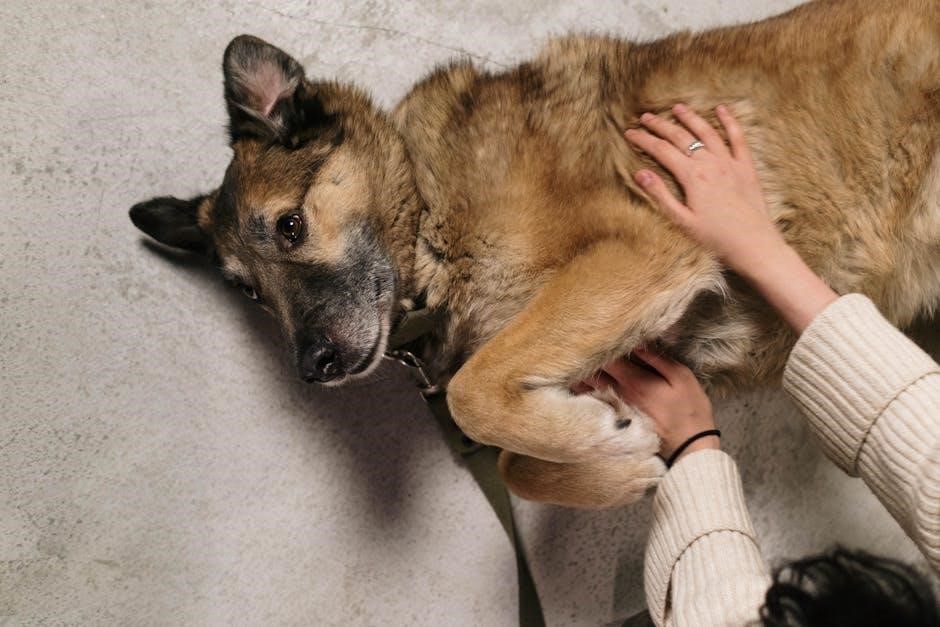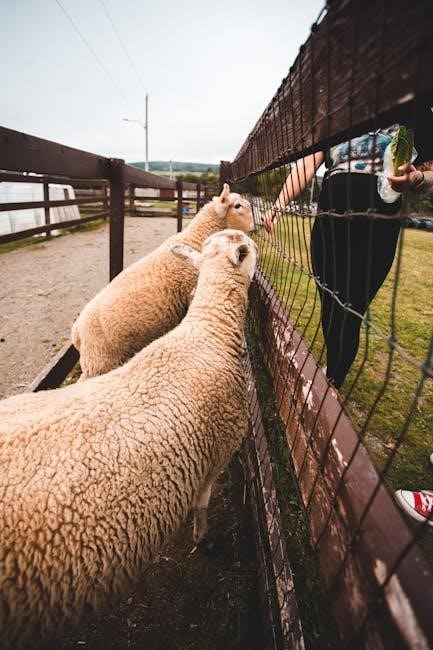german shepherd feeding guide

German Shepherd Feeding Guide Overview
A comprehensive guide to German Shepherd nutrition, covering life stages, diet types, and health considerations. Ensures balanced meals tailored to age, size, and activity level for optimal health.
German Shepherds are an energetic and intelligent breed requiring a well-balanced diet to maintain their health and performance. Their nutritional needs vary by age, size, and activity level, emphasizing high-quality protein, healthy fats, and complex carbohydrates. Proper nutrition supports their muscular build, joint health, and digestive well-being. Consulting a vet is crucial to ensure meals meet their specific requirements, avoiding deficiencies or excesses that could lead to issues like obesity or malnutrition. A tailored feeding plan helps optimize their energy levels and overall quality of life.
Life Stages and Feeding Requirements
German Shepherds require tailored diets across life stages: puppies need frequent, nutrient-rich meals; adults need balanced nutrition for maintenance; seniors need joint and digestive support.
Puppy Feeding Schedule: Up to Six Months
Puppies under six months require frequent, nutrient-rich meals to support rapid growth. Feed 3 times daily, transitioning to twice a day by one year old. High-quality protein from sources like chicken or fish is essential for muscle development. Ensure meals are tailored to their weight and activity level. Avoid overfeeding to prevent obesity. Consult a vet to adjust portions and ensure a balanced diet for optimal growth and health. Proper nutrition during this stage sets the foundation for a strong, healthy adult German Shepherd.
Adult Feeding Schedule: One to Seven Years
Adult German Shepherds typically thrive on two meals per day, ensuring a balanced diet that maintains their energy and health. Feed high-quality food with adequate protein, fats, and carbohydrates. Monitor portion sizes based on weight and activity level to prevent obesity. Active dogs may require more calories, while less active ones need fewer. Adjustments should be made gradually and tailored to individual needs. Regular vet check-ups can help ensure the diet remains optimal for their age and lifestyle, promoting long-term health and vitality.
Senior Feeding Schedule: Eight Years and Older
Senior German Shepherds, aged eight and older, require a tailored diet to support joint health and manage weight. Feed them twice daily, focusing on high-quality, easily digestible food rich in fiber and moisture. Caloric intake should be reduced to prevent obesity, while ensuring essential nutrients like glucosamine are included to support joint health. Monitor their weight and health conditions closely, adjusting portions as needed. Regular veterinary check-ups are crucial to address age-related issues and maintain optimal health in their golden years.

Diet Types for German Shepherds
German Shepherds thrive on kibble, raw food, or homemade diets, each offering unique benefits. Kibble is convenient, raw diets promote health, and homemade ensures customization for specific needs.
Kibble: Pros and Cons
Kibble is a popular choice for German Shepherds, offering convenience and cost-effectiveness. It provides balanced nutrition and supports dental health through chewing. However, some dogs may develop sensitivities to grains or fillers. High-quality kibble with whole ingredients is recommended to avoid potential allergies or digestive issues. Always consult your vet to ensure the chosen kibble meets your German Shepherd’s specific needs and health conditions.
Raw Food Diet: Benefits and Considerations
A raw food diet for German Shepherds can provide essential nutrients and mimic natural eating habits. Benefits include improved digestion, reduced allergies, and stronger immune systems. However, raw diets require careful balancing to ensure adequate nutrition. Risks include bacterial contamination from raw meat and potential deficiencies if not properly formulated. Homemade raw diets should be vet-approved to avoid health issues. Some owners swear by its benefits, but safety and balance are crucial for long-term health.
Homemade Diets: How to Ensure Balance
A homemade diet for German Shepherds allows customization but requires careful planning to ensure nutritional balance. Consulting a veterinarian or canine nutritionist is essential to create a diet that meets your dog’s needs. Focus on high-quality protein sources, whole grains, and essential vitamins and minerals. Avoid fillers and ensure a gradual introduction of new foods to prevent digestive issues. Regular monitoring of your dog’s health and adjustments to the diet are crucial for maintaining optimal wellness and preventing deficiencies.

Nutritional Requirements
German Shepherds require a diet rich in high-quality protein, healthy fats, and essential vitamins and minerals to support muscle development, energy, and overall health.

Essential Nutrients: Protein, Fats, and Carbohydrates
German Shepherds need a balanced diet with high-quality protein from animal sources, such as chicken or beef, to build and repair muscles. Fats provide energy, while carbohydrates, like whole grains, offer sustained vitality. Proper ratios ensure optimal health, preventing deficiencies and supporting their active lifestyle. Adequate protein aids in muscle growth, fats boost energy levels, and carbs provide endurance, making these nutrients crucial for their overall well-being and performance.
Vitamins and Minerals: Their Role in Canine Health
Vitamins and minerals are vital for German Shepherds’ overall health. Calcium and phosphorus support strong bones, while vitamin D aids in nutrient absorption. Vitamin A promotes vision and coat health, and vitamin E boosts immune function. B vitamins aid metabolism and energy production. Minerals like zinc support skin health, and iron is essential for blood function. A balanced mix ensures optimal health, preventing deficiencies. High-quality dog food typically provides these nutrients, but consulting a vet can help tailor needs to individual requirements.

Feeding Schedules and Portion Control
German Shepherds require consistent feeding schedules and portion sizes tailored to age, weight, and activity level. Adjust portions to prevent overfeeding or underfeeding, ensuring optimal health and energy levels.
Feeding Frequency: Puppies vs. Adults
Puppies under six months require more frequent feeding, typically 3-4 meals a day, to support rapid growth and energy needs. Adults, however, thrive on 1-2 meals daily, depending on activity levels and weight. Gradually reduce feeding frequency for puppies as they mature, ensuring a smooth transition to adult feeding schedules. Monitoring their health and adjusting portions helps maintain optimal weight and energy levels throughout their life stages.
Portion Sizes Based on Weight and Activity Level
Portion sizes for German Shepherds should be tailored to their weight and activity level. An adult weighing 80 pounds may need around 1,850 calories daily. Active dogs require larger portions, while less active dogs may need smaller servings to prevent obesity. Adjust food quantities based on individual energy expenditure and monitor weight to ensure a healthy balance. Consulting a vet for personalized portion recommendations can help maintain optimal health and prevent overfeeding or nutritional deficiencies.

Common Health Issues and Dietary Adjustments
German Shepherds often face hip dysplasia and digestive sensitivities. Adjusting diets to include joint supplements and easily digestible ingredients can help manage these conditions effectively and improve quality of life.
Managing Hip Dysplasia Through Nutrition
Nutrition plays a key role in managing hip dysplasia in German Shepherds. Feeding a balanced diet rich in joint-supporting nutrients like glucosamine and omega-3 fatty acids can help reduce inflammation and improve mobility. Avoiding excessive weight is crucial, as extra pounds can strain joints. A raw food diet or high-quality kibble with anti-inflammatory properties, such as turmeric or green-lipped mussels, may be beneficial. Consult a vet to tailor a diet that supports joint health and slows disease progression.
Dietary Considerations for Digestive Sensitivities
German Shepherds with digestive sensitivities benefit from tailored diets to ease symptoms like upset stomachs or skin allergies. Pro Plan’s sensitive skin and stomach formulas are often recommended, avoiding common allergens like chicken. Incorporating easily digestible ingredients such as mashed sweet potatoes or pumpkin can help soothe digestive issues. Avoiding grains or switching to novel protein sources may also alleviate sensitivities. Always consult a vet to determine the best dietary adjustments for your dog’s specific needs and ensure a balanced, healthy diet.

Monitoring and Adjusting Your German Shepherd’s Diet
Regularly monitor your German Shepherd’s health and adjust their diet based on age, activity level, and any emerging health issues. Consult a vet for adjustments.
Recognizing Signs of Nutritional Deficiency
Watch for dull coats, weight loss, lethargy, or skin issues, which may indicate nutritional deficiencies. Poor digestion, joint pain, or weakened immunity can also signal inadequate diet. Ensure your German Shepherd receives balanced nutrients, including protein, vitamins, and minerals, to prevent these issues. Consult a vet if symptoms persist, as deficiencies can lead to serious health problems like hip dysplasia or digestive sensitivities. Regular monitoring and dietary adjustments are crucial for maintaining optimal health.
When and How to Transition Between Diets
Transitioning your German Shepherd’s diet should be done gradually to prevent digestive upset. Start by mixing a small portion of the new food with the current diet, increasing the ratio over 7-10 days. Monitor for signs of digestive sensitivity or allergic reactions. Adjust the pace if issues arise. Ensure the new diet meets their nutritional needs for their life stage and activity level. Consult a vet before making significant changes, especially for puppies or seniors, to ensure a smooth and healthy transition.